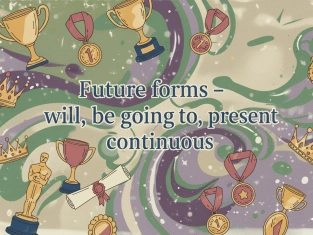Future Continuous vs Future Perfect
Table of Contents
Exercises
Explanation
1. Future Continuous
Form: will / won’t be + verb-ing
We use the Future Continuous to talk about actions that:
A. Will be in progress at a specific future time
-
At 10 p.m., I will be driving home.
-
Don’t phone at noon — we will be having lunch.
-
This time tomorrow, she won’t be working; she’ll be relaxing.
B. Are temporary or part of a short future plan
-
Next month, I will be staying in a hostel while my flat is repaired.
-
For the next few days, we will be using my brother’s car.
-
Will you be working weekends in your new job?
2. Future Perfect
Form: will / won’t have + past participle (V3)
We use the Future Perfect for actions that:
A. Will be completed before a future time
-
By 6 o’clock, I will have cooked dinner.
-
They will have built the new bridge by next winter.
-
Will you have finished the report before the meeting starts?
B. Show how long something will have continued by a future date
-
In two years, we will have lived here for a decade.
-
By next April, she will have worked in the company for five years.
Common time expressions:
by, by the time, before, in a year / in two months, by next week
-
I won’t have completed the project by Friday.
-
By the time we get home, the children will have fallen asleep.
-
In six months, he will have saved enough money to travel.

